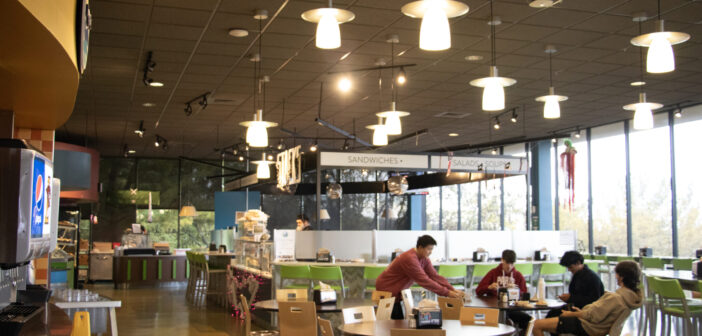During the Thanksgiving and spring breaks, dining options for students who stay on campus are limited to Common Grounds, Market X and Iacocca Cafe. The latter two which are located on Mountaintop Campus.
Lehigh’s campus dining options were fully reopened following spring break on March 18.
David Joseph, the executive director of Auxiliary Services, said anywhere from 300 to 350 students stay on campus over Thanksgiving break, mainly including international students and athletes.
The athletic department uses its budget to provide food for students, whereas other offices, such as the Office of International Students and Scholars (OISS), are responsible for assessing whether other students may need additional help with food access.
Joseph said until recently, students themselves were solely responsible for sourcing food over breaks.
“Over the years, things have changed and evolved,” Joseph said. “Years ago, I can tell you, we did basically nothing.”
He said new changes came about when the COVID-19 pandemic caused a greater need for food assistance among students over breaks.
Since then, he said the university has made a more conscious and coordinated effort to ensure accessibility.
The OISS; Student Access and Success; and Diversity, Inclusion and Equity collaborate with dining services to determine and meet students’ needs.
This includes measures such as distributing GoldPLUS funds for students to use at restaurants on the Southside, which was done over Thanksgiving break last fall.
Hannah Peik, ‘26, was one of the students who benefitted from these university efforts.
Because Peik is from Idaho, she has spent several breaks on campus and usually shops at local grocery stores for food.
Peik said having access to GoldPLUS dollars last semester made managing food purchases easier.
“It definitely was helpful, just because the majority of the restaurants in the area accept that,” Peik said. “It made it so that I didn’t have to have groceries for every meal.”
As for dining halls, Auxiliary Services performed a pilot program in January 2024 to determine the interest level in keeping Rathbone open over break.
The program lasted from Jan. 3 to Jan. 20, and many of the participants were provided with a meal plan paid for by the university.
Of the 47 students who signed up, between 10 and 15, on average, visited Rathbone, which resulted in a financial loss for the university.
The offices involved in the pilot program are expected to follow up with students to receive program feedback, as the reasons for low participation were unclear.
“We aren’t quite sure why students, especially if (the meal plan) was covered and paid for them, did not come to Rathbone to eat on those days,” Joseph said.
He said it is unlikely the dining hall will remain open during future breaks due to these cost concerns.
Joseph said even keeping Common Grounds or Iacocca Cafe open over these breaks is too costly for the university. With a significantly diminished population on campus during these breaks, there is very little business generated during this time.
He said many dining staff members deserve to be with their families over the holidays, which creates an additional challenge to providing easy access to food for students who do stay on campus.
Nonetheless, the university has found other ways of providing for these students.
Over the years, the OISS has provided international students with opportunities for social gatherings and food over breaks.
One of these opportunities included a Thanksgiving Host Program, where students are connected with faculty and other students who invite them to spend Thanksgiving dinner with their families.
Thiyara Girihagama, ‘24, is an international student who participated in the program this past fall.
“We were helping prepare the food and we had a nice Thanksgiving together,” Girihagama said. “So those kinds of programs I think are good to have.”
Joseph said determining what food options are best for students during these times is still a challenge, as exhibited by the issues faced during the January pilot program.
“The hardest part from the housing and dining side is trying to determine what is the real need out there,” Joseph said.






Comment policy
Comments posted to The Brown and White website are reviewed by a moderator before being approved. Incendiary speech or harassing language, including comments targeted at individuals, may be deemed unacceptable and not published. Spam and other soliciting will also be declined.
The Brown and White also reserves the right to not publish entirely anonymous comments.